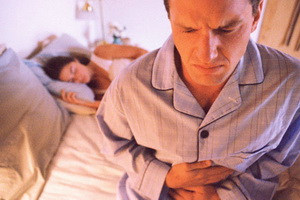
Most students know about gastritis. Power in the dry, hassle in the exams, and that's the logical result. In the spring and autumn, digestive problems begin: the stomach aches, and so that sometimes you want to howl, it makes you sick, and only the right cocktail "a teaspoon of soda to a glass of water" saves you from heartburn. What? Gastritis - inflammation of the mucous (inner) wall of the stomach. When the inflammation passes to the duodenum, so-called gastroduodenitis is formed.
There are two types of gastritis and gastroduodenitis: with a decreased and increased acidity of the gastric juice.
Diseases are acute - occur for the first time and occur violently, and chronic - seizures are repeated not very often, but with an enviable regularity. If acute gastritis is not cured, over time it becomes chronic.
Gastritis and gastroduodenitis are the most common diseases of the gastrointestinal tract, according to statistics, they are sick more than half of the adult population of the Earth.
Causes
The causes of gastritis and gastroduodenitis are diverse: malnutrition: addiction to acute, hot and rough food, excessive alcohol consumption, irregular meals, dry food; Stress; Bacterium Helicobacter pilori; - long-term use of certain medicines (aspirin, some antibiotics); smoking; Intestinal infections; Chronic infections in the oral cavity and pharynx (carious teeth, inflammation of the tonsils); Diseases of the gallbladder, liver, pancreas. What's happening? When gastritis affects the entire mucosa of the stomach, this affects his glands that produce components of gastric juice and protective mucus, as well as worsen the processes of cell repair. As a result, the work of the stomach is disrupted, it ceases to cope with the digestion of food.
In conditions of inflammation of the mucous membrane of the stomach, its absorption capacity is increased, which often leads to intoxication of both the stomach and the whole organism. This is manifested by the deterioration of the general condition, rapid fatigue, reduced performance, especially with physical exertion.
How is it recognized?
The first attack of the disease usually takes a person by surprise. Suddenly, there are sharp cramping pains in the upper abdomen, with nausea and vomiting, from neither, nor from this (more often on an empty stomach). With gastritis, the patient can also suffer heartburn or "acidic" eructations, bloating and a feeling of overflow, diarrhea and constipation.
It happens that chronic gastritis is hidden, the person practically does not care about anything, and he considers himself to be completely healthy. But in fact, very unpleasant things are happening in his stomach.
What is dangerous?
Severe gastritis and gastroduodenitis can result in bleeding from the stomach and duodenum. Diagnosis The diagnosis of gastritis and gastroduodenitis is made by a gastroenterologist after examination and a number of studies: esophagogastroduodenoscopy, radiographic examination of the stomach. By the way, today doctors manage to detect this disease with the help of ultrasound. If chronic gastritis also conducts a study of gastric secretion and a biopsy of the gastric mucosa.
It is very important not to confuse gastritis with peptic ulcer, the signs of both are very similar to each other!
Treatment
Treatment of gastritis and gastroduodenitis includes: diet: the first 1-2 days of illness it is better to refrain from eating at all, only drink is allowed, then use gentle food (warm, low-fat, wiped dishes); A variety of drugs: adsorbing toxins, enveloping the walls of the stomach, painkillers, improving digestion in the sick stomach, reducing acidity; Sometimes, to get rid of the infection, patients are prescribed antibiotics. Treatment is most often performed at home, it takes 2-3 weeks, chronic gastritis is treated longer (up to two years). However, even outside the course of treatment in both acute and chronic gastritis, it is desirable to consistently adhere to a diet (limiting acute, hot, rough meals, limiting consumption of coffee, carbonated drinks, alcohol, smoking cessation). Choose the most suitable diet regime will help a doctor-gastroenterologist or nutritionist.
To control the treatment most often carry out repeated esophagogastroduodenoscopy. Patients with chronic gastritis should be on dispensary supervision and visit the doctor at least twice a year.


